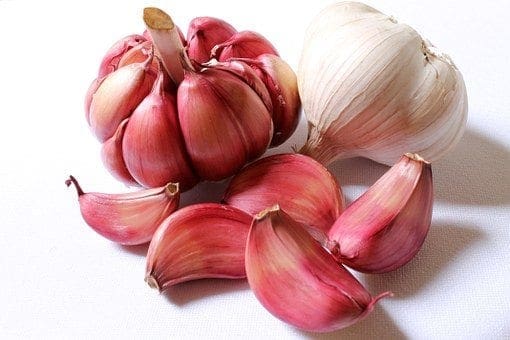
by Dr Alex Jimenez DC, APRN, FNP-BC, CFMP, IFMCP | Diets, Lower Back Pain, Wellness
El Paso, TX. Chiropractor Dr. Alex Jimenez investigates if garlic works for back pain.
Test�It Out yourself! Spaghetti, Oil & Garlic.
In my never-ending quest to learn everything I can about the best way to reduce back pain, I conduct research online frequently. Everything from tried and true remedies�like yoga, the latest scientific studies about nutrition as well as foods that promise to possess anti-inflammatory properties � are all on my radar. My intention is always to leave no stone unturned in the event the advice I uncover can reduce someone�s suffering.
So, the other day, when several pages of results turned up, I Googled �natural remedies for back pain� and wasn�t surprised. Granted, not everything you read on the Internet is accurate�in fact, finding information that is credible needs some sophistication. Briefly, it makes sense appraise the purpose of the source, to find out the source and look at the domain name when making a judgement call about it.
All of us know that pain can be alone triggered by inflammation, so minimizing or controlling it may be effective. If it�s accurate that in addition to truly being a vampire repellant, garlic is also an antiinflammatory power food (as some are promising), I�m game to start adding more to my diet.
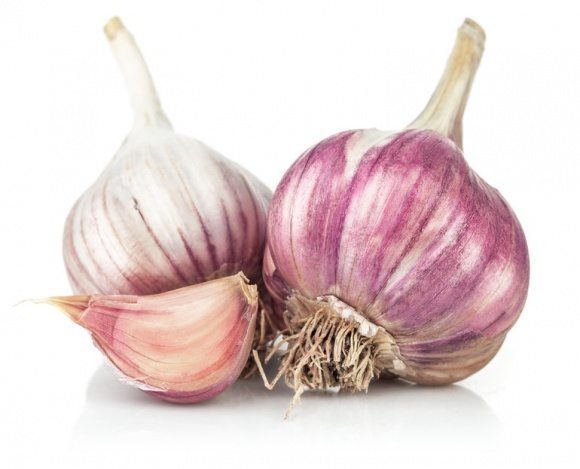
On my way down the research rabbit hole, I came across some amazing facts from the Journal of Immunology (1), Journal of Immunology Research (2) and the University of Maryland Medical Center (3).
- Plants of the genus Allium are known for his or her creation. Among these, garlic (Allium sativum) is one of the very broadly used.
- Isolated and when expressed, these compounds display a broad spectrum of effects that are beneficial against microbial diseases and therefore are employed to safeguard against cardiovascular disease.
- Garlic is now being analyzed because of its ability to boost the immune system and potentially fight with cancer.
- Garlic contains allicin, a strong, sulfur-based compound that is in charge of the distinctive smell, but may also be the basis for �s antibacterial properties that are garlic.
Don�t Rush�The Rose
Garlic, frequently known as the �stinking rose does seem to have a full bouquet of health benefits. But preparation questions. Research supports that heating garlic soon interferes with the health-boosting benefits of allicin.
Cooks Take Note:
Be sure to let minced, chopped or crushed garlic to sit down for 5 to 10 minutes before warming. If you throw it into boiling water or that hot olive oil too soon and are inpatient, you’ll deactivate the valuable enzyme. Patience is definitely a virtue as it pertains to preparing this gold nugget!
Another Advantage Of Garlic, It’s Affordable!
At my last trip to the grocery store, a great-size bulb of garlic was priced at 99 cents. Paradise for under a dollar! All this adds up to what looks just like a total no-brainer to me. Add garlic to my diet. Obtain numerous health benefits. It couldn�t be more or considerably simpler cost-effective than that.
Over summer time, I made a decision to create a concerted effort to consume more garlic, and you also know what? I�ve found I have significantly more energy and feel better. Now it might be pure coincidence, but I�m going to continue my regime of taking one clove in the morning (I just chop the garlic, wait for allicin to activate, then consume the little sections with water). I�ve also been incorporating it to the main meal of the day. All things considered, except for ice cream, what doesn�t taste better using a tiny garlic?
Therefore I encourage you to give it a try and, as the famous, Greek philosopher Hippocrates once said: �Let food be thy medicine and medicine be thy food.�
I�d love to hear your experiences with garlic are going. Please fill me in on how it helped you, or if it didn�t. Share your comments on our Facebook page. Recipes additionally welcomed!
Meanwhile, enjoy this healthful and simple meal that is deliciously. And contemplate giving garlic a standing invitation to your own dinner table!
Spaghetti, Oil and Garlic. Buon Apetito!
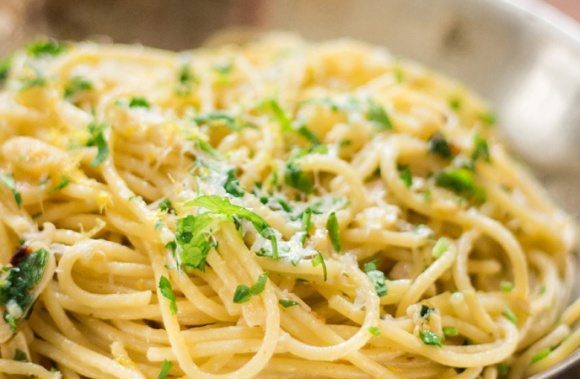
- Cook spaghetti according to directions
- Save 1 cup of starchy pasta water when you drain it.
- Chop 4 gloves of garlic�allow to breathe 5 to 10 minutes and then brown in olive oil
- Add pasta water to help produce a sauce that may stick to the pasta.
- Transfer pasta noodles to garlic and oil
- Mix and top using a sprinkling of parsley and lemon zest
- Add freshly -grated Parmesan cheese to taste. Enjoy!

Call Today!

by Dr Alex Jimenez DC, APRN, FNP-BC, CFMP, IFMCP | Diets, Weight Loss, Wellness
El Paso, TX. Chiropractor Dr. Alex Jimenez takes a look at the Mediterranean diet.
I eat a wide variety of delicious foods every day including pasta dishes, curries, cheese and chocolate. I also drink red wine most days. Yet I’m in the best shape of my life and I’ve never felt healthier.
What’s my secret? Actually it’s not a secret at all. You’ve no doubt heard many good things about the Mediterranean diet. You probably also know that Asian diets, such as the Japanese diet, are also extremely healthy. All I did was combine the best parts of these traditional and highly appetising diets into one ‘MediterrAsian’ diet — so I literally get the best of both worlds.
I didn’t come up with this concept alone. In fact it was an extraordinary set of circumstances that led me to follow a MediterrAsian way of eating in the first place.
My parents are both medical doctors, so I’ve always had a natural interest in health and healthy living. But it wasn’t until I was introduced to authentic Asian cuisine by my Chinese-Malaysian sister-in-law in my late teens that I discovered that healthy food and delicious food could be one in the same. This was a revelation to me, and I’ve been hooked on Asian food ever since.
Then, in my early twenties, I met and fell in love with Ric. Like me, Ric was very interested in health and healthy living. That was mainly because he’d lost his own health following a near-fatal motorcycle accident six years earlier. After lots of struggle and pain, he only fully regained his health by adopting a Mediterranean diet. When we met, I introduced Ric to Asian cooking and he introduced me to Mediterranean cooking. We ended up bonding over pad Thai and paella!
We also discovered there were so many benefits to eating a combined diet of Mediterranean and Asian foods. One of the biggest benefits was for our taste buds! So many of the world’s most mouth-watering foods originate from Mediterranean and Asian regions, including pasta, pizza, risotto, sushi, curries, and stir-fries. So we never felt deprived. And the health benefits were also extraordinary. From getting us in the best shape of our lives to improving our cholesterol and blood pressure, and giving us bucket loads of energy.
What Exactly Makes MediterrAsian Eating So Health Giving?
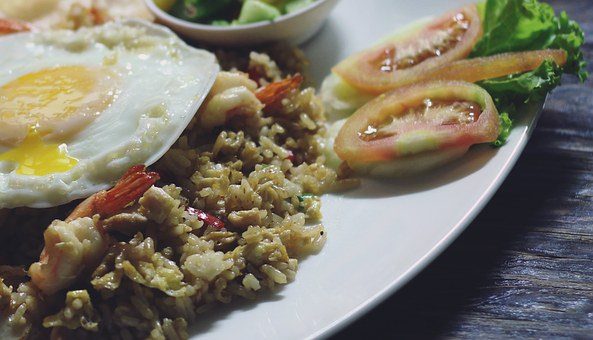
Actually, we’ve discovered there are a number of important reasons. Unlike modern Western diets that are full of highly processed foods, traditional Mediterranean and Asian diets are based on a foundation of minimally processed plant foods. These vegetables, fruits, grains and beans are bulky and filling but are generally low to moderate in calories. Fish and shellfish, which are also traditional Mediterranean and Asian staples, are also quite low in calories and are a good source of hunger-suppressing protein. So, these foods fill us up long before they fill us out. They also more than counter-balance the higher calorie foods we do eat, such as olive oil, nuts and cheese. This means we end up feeling comfortably full after a meal, without consuming more calories than our bodies need.
Traditional Mediterranean and Asian foods are also overflowing with health-promoting compounds including dietary fibre (which also happens to be one of nature�s best appetite suppressants), omega-3 fatty acids, phytochemicals and antioxidants.
But there’s another big reason why combining Mediterranean and Asian eating practices make so much sense. And it comes down to how the foods in these traditional diets affect our genes.
Scientific research in recent years has found that many foods common in Mediterranean and Asian diets (such as olive oil, red wine, turmeric, green tea, dark chocolate and soyfoods) are rich in natural plant compounds that activate a type of gene in the body called sirtuins. Studies have found that sirtuins play a fundamental role in extending cellular life and the repair of DNA. They also inhibit fat storage and increase fat metabolism.
That’s why a diet rich in sirtuin-activating foods, or “sirtfoods,” is being recommended by a growing number of health experts. In fact, Adele credits much of her dramatic weight loss with following a diet rich in sirtfoods.
So if you want to get healthy and in shape, reduce your risk of chronic disease and live longer — all while enjoying a wide range of delicious foods — we highly recommend you give a MediterrAsian way of eating a go.

Call Today!
— Trudy Thelander is co-author of the acclaimed cookbook, The MediterrAsian Way, and co-creator of the newly-released mobile cooking app, The MediterrAsian Table.
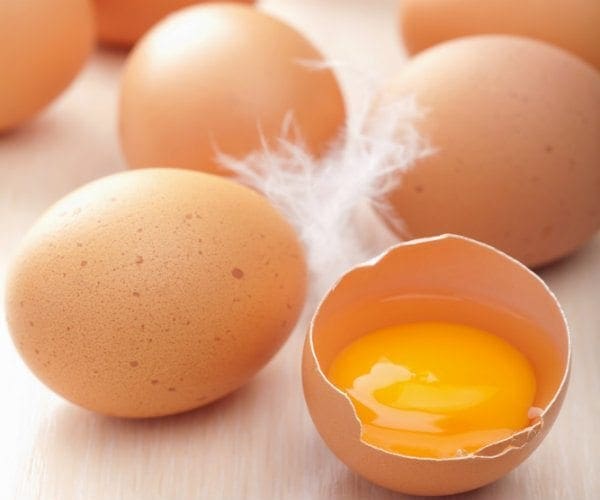
by Dr Alex Jimenez DC, APRN, FNP-BC, CFMP, IFMCP | Diets, Fitness
It’s hard to overcome a bad reputation — even for food! But some edibles once deemed to be health hazards have been vindicated by the ever-evolving science of nutrition.
“With new research emerging on these topics, our recommendations change,” says Kelly Pritchett, national media spokesperson for the Academy of Nutrition and Dietetics.
It happened with eggs. One of America’s most popular breakfast foods was branded a villain to heart health in the 1970s due to high levels of cholesterol. Now, experts are changing their tune. They’re even singing praise for the egg — yoke and all.
“The 2015 Dietary Guidelines gives the thumbs-up on having one egg per day,” says registered dietician Joy Dubost. “Eggs are an all-natural source of high quality protein and a number of other essential nutrients, all for 70 calories per large egg.”
In a 2013 study, participants who ate an egg breakfast were better able to control their food intake than those who a carbohydrate-heavy cereal breakfast. And don’t go the egg white-only route. The yolk is packed with three grams of protein as well as vitamins D and B12, riboflavin, folate, phosphorous, selenium and choline.
Here are seven other good foods with bad reps:
Whole milk: A 2015 review of 25 studies published in the European Journal of Nutrition found that people who ate full-fat dairy products were no more likely to develop cardiovascular disease or Type 2 diabetes than those who stuck with the low-fat versions. Even more surprising, the full-fat crowd reported less weight gain and obesity. Experts recommend drinking only organic milk from grass-fed cows.
Coconut oil: A high saturated fat content tarnished the reputation of coconut oil, but research reveals that much of it is medium-chain triglycerides, which are healthy fats that boost both immunity and metabolism. A study published in the journal Lipids found that coconut oil reduced abdominal fat. It’s also one of the healthiest oils for cooking because it can withstand high heat without oxidizing better than vegetable oils.
Potatoes: The carb-heavy spud was kicked to the curb due to its high glycemic index, meaning it can spike blood sugar. But pairing potatoes with protein or healthy oils slows down digestion of them. Furthermore, potatoes are low-calorie, very filling and rich in several nutrients, including potassium, fiber and vitamin C. Eat the skin and you’ll also reap powerful antioxidants. Just don’t deep fat fry them or slather a baked tater with gobs of butter, sour cream and bacon bits.
Popcorn: All bets are off if you eat this movie theater munchie bathed in unhealthy oils — or cooked in a microwaveable bag lined with toxic chemicals. But air-popping organic popcorn will deliver a 100-calorie whole grain treat, per three-cup serving, that also delivers three grams of fiber and more healthy phytonutrients than most fruit.
Coffee: Once blamed for stunting growth and contributing to various maladies including heart disease and cancer, coffee is now being hailed as healthy for most folks. In fact, research published in the journal Circulation found that people who downed three to five cups a day were 15 percent less likely to die from any cause than non-coffee drinkers. Credit the anti-aging flavonoids for protecting cells from deterioration. Just don’t go dumping a lot of fattening sugars and creams into your java.
Avocados: It’s hard to believe that the U.S. Food and Drug Administration only got around to declaring this superfood to be “healthy” in May 2016. The problem previously was its high fat content, but most of it is the healthy monounsaturated kind. Avocados are not only rich in nutrients but their fats also help you to absorb fat-soluble nutrients from other foods. So go ahead and order the guacamole, but nix the chips!
Beer: The sudsy stuff is a source of B vitamins and minerals, including potassium, magnesium and bone-building silicon. It’s also loaded with antioxidants. “Beer is not just empty calories,” declares Dubost. “In addition to the nutrients, large population studies consistently show that moderate alcohol consumption, including beer, reduces mortality.”
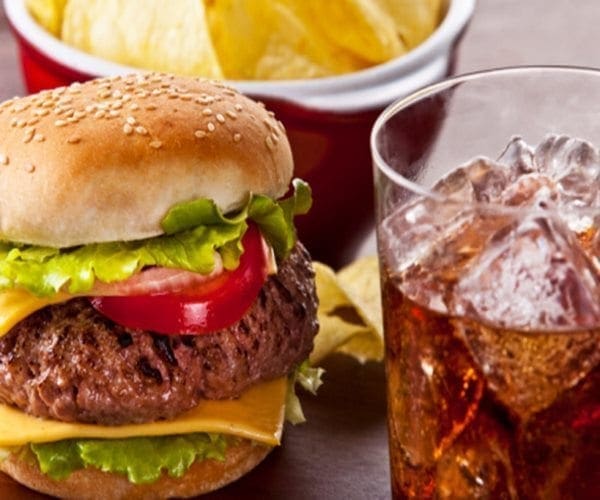
by Dr Alex Jimenez DC, APRN, FNP-BC, CFMP, IFMCP | Diets, Fitness
Australian researchers have found that a diet high in saturated fat is a prime suspect in the onset of osteoarthritis after finding that it changes the composition of cartilage, especially in the weight-bearing joints of the hip and knee.
“Our findings suggest that it’s not wear and tear but diet that has a lot to do with the onset of osteoarthritis,” said lead researcher Professor Yin Xiao.
In possibly the first study to investigate the link between osteoarthritis and common dietary fatty acids, scientists at the Queensland University of Technology studied the effects of diets rich in a variety of fatty acids, found in butter, coconut oil, palm oil, and animal fat, and simple carbohydrates. Simple carbs found in sugar, corn syrup, and high-fructose corn syrup and the combination of high-fat, high-carb foods are commonly known as “junk food.”
“The main function of cartilage is to seal the bone ends in a joint and absorb pressure on the bones during weight-bearing movement such as walking,” said Xiao.
“We found that a diet containing simple carbohydrates together with 20 percent saturated fats produced osteoarthritic-like changes in the knee.
“Saturated fatty acid deposits in the cartilage change its metabolism and weaken the cartilage, making it more prone to damage. This would, in turn, lead to osteoarthritic pain from the loss of the cushioning effect of cartilage.
“We also found changes in the bone under the cartilage on a diet rich in saturated fat.”
But when the team tested lauric acid, a saturated fatty acid found in coconut oil, their findings were different. “Interestingly, when we replaced the meat fat in the diet with lauric acid we found decreased signs of cartilage deterioration and metabolic syndrome so it seems to have a protective effect,” said researcher Sunder Sekar.
He said fatty acids could cause tissue inflammation throughout the entire joint. “We tested a variety of saturated fats and found that long term use of animal fat, butter, and palm oil could weaken the cartilage.
“Replacement of traditional diets containing coconut-derived lauric acid with palm oil-derived palmitic acid or animal fat-derived stearic acid has the potential to worsen the development of both metabolic syndrome and osteoarthritis,” Sekar said.
Other studies have found that coconut oil benefits the body in many ways, including reducing the deep abdominal fat that’s a risk for heart disease, and reducing the buildup of proteins in the brain associated with Alzheimer’s.
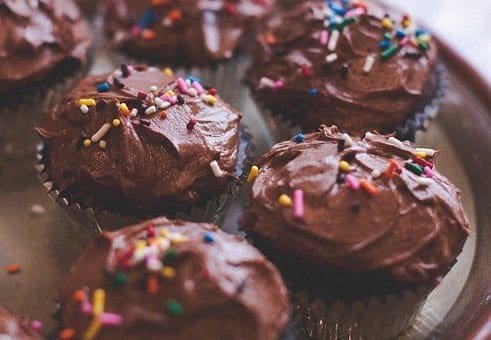
by Dr Alex Jimenez DC, APRN, FNP-BC, CFMP, IFMCP | Diets
El Paso, TX. Chiropractor Dr. Alex Jimenez takes a look at desserts and sweets.
Would you feel guilty eating sweets? You must not. There’s nothing wrong with eating an occasional sweet. It is much wiser to plan a dessert that is sweet again and now, rather than deprive yourself for weeks only to eat half your body weight in sweets later.
Balance Counts
Regrettably, way too many Americans eat way too much sugar. Our per capita consumption of sugar is 120 pounds per year! This works out to 600 extra calories a day which are devoid of any nutritional value. In view of the fact, it is obvious why Americans have a problem with obesity while falling short with other crucial nutrients like calcium, iron and folic acid.
A short note has to be stated about carbohydrates along with the bodies’ capacity to burn them. Which food would you believe causes obesity? As sugar is a concentrated supply of carbohydrates, extra calories can be carried by it. Excessive calories are converted into fat!
It can cause other health problems although sugar in the diet does not have the killer status of salt and fats. Tooth decay can function as the effect of sweets taken in between meals. Honey, which many believe is fitter than table sugar, truly has a paste which adheres cavity causing bacteria to teeth.

Sugar:�An Acquired Taste
Luckily our taste for sweets is acquired substantially like our taste for salt. This means by changing the numbers in our diet we can alter our flavor acquity for sugar.
Gradually replace less sweet foods, like tea biscuits and fruit tarts, for icing-load cakes and cookies. Make some of your favorite recipes with a third less sugar. Without altering the final product the sugar generally in most recipes can be reduced by 50 to 75 percent. You may use half the amount of concentrate to produce the same amount of sweetness as fruit juice concentrate is as sweet as sugar. Fruit juice concentrate additionally helps supply moisture to baked goods which are reduced in fat.
Assess the “tips” section for additional thoughts on checking your sweet tooth. Don’t forget, you want nutritional value for your calories. More healthy options go a long way in making you fit thin and cut.
Strategies For Cutting Back On Sugar
- If sweets are your downfall, try saving them. Plan cookie or a candy bar on the weekends, say, ahead of time. It’s far better to incorporate them to them than binge when feeling deprived.
- Bake your own sweets. Or try substituting applesauce for sugar in muffin and sweet bread recipes.
- Use dried fruits in cookies as additional sweeteners. As stand alone snacks beware as they�may stick to teeth and are rich in calories.
- Use powered sugar as a substitute for icings on chocolate cakes. Get a doilie and position on top of cake. Sprinkle powdered sugar on top and remove doilie… Wallah! Poetry with no additional fat!
- Use “conserves” instead of “preserves”. The former do not have added sugar.
- Use sliced fresh fruit for pancakes or french toast. Sprinkle with powdered sugar. This helps bypass the maple syrup.
- Buy basic non fat yogurt and add your own personal fresh fruit. Flavored yogurts can include up to seven teaspoons of sugar that is added. This works nicely for sweetening chilly goods, but breaks down in cooking.
- Search for more than four grams of fiber and breakfast cereals with six grams or less of sugar that is added. Browse the label and beware of words that end with “ose”. These are sugars also: corn syrup solids, dextrose, maltose etc.
- Create your personal drink with half fruit juice and half mineral water.�These items can have just as much sugar as sodas.
- Eat fresh fruit whenever possible. When buying canned fruit, purchase those packaged within their very own juice or “lite” syrup.
- Avoid having sweets near “guests.” It is likely that you’ll eat them before your friends and family will.

Call Today!
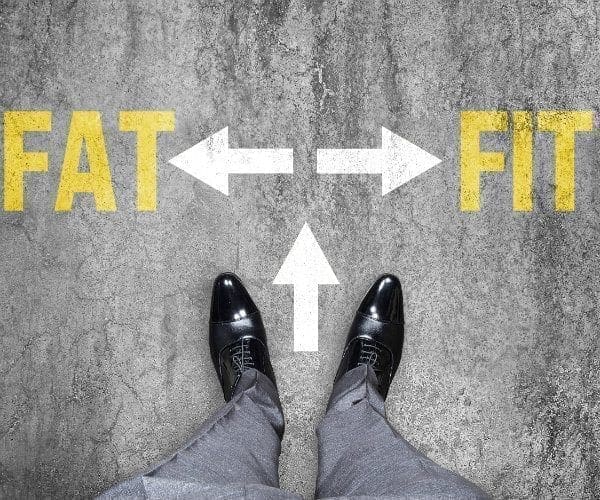
by Dr Alex Jimenez DC, APRN, FNP-BC, CFMP, IFMCP | Diets, Fitness
One in three Americans is overweight and another third are obese, according to the Centers for Disease Control and Prevention. But while carrying too many extra pounds can increase your risk for heart disease, diabetes, and some cancers, health experts say a little bit of flab may actually be healthy.
But there is a kind of “Goldilocks Effect” — not too much, not too little — when it comes to body fat.
“Researchers have concluded that fat is actually a vital organ that releases hormones and sends special signals to the brain,” notes Dr. Holly Lucille, ND, RN. “Fat is an important macro nutrient and like any other macro nutrient, the quality makes a difference. Having the right kind of fat on your body is both protective and important.”
Jeffrey Friedman, a molecular biologist at Rockefeller University was among the first scientists back in the 1980s to discover that there was more to fat than merely storing calories. In his experiments with mice, he found that fat produces a hormone called leptin which is released into the bloodstream and binds with the areas in our brain that are responsible for appetite.
His lab’s obese mice had a genetic defect in their fat that prevented the manufacture of leptin which gave them the signal to stop eating. Humans with the same genetic defect can eventually eat themselves into obesity and premature death.
So, losing weight becomes a double-edged sword. When we lose fat, we lower our levels levels of leptin, the appetite off switch, and we become hungrier than before.
Leptin also affects our muscles and thyroid hormones so that lower levels of leptin slow down our metabolism. This combined effect drives us to regain weight. It may also explain why extreme dieters who lose vast amounts of weight in short periods of time nearly always gain it all back — and then some, scientists say.
Scientists also know that fat affects the size of our brains. People who are genetically leptin-deficient have smaller brain volume in some areas as do patients who are suffering from eating disorders such as anorexia which leave them malnourished. Leptin is also helpful in healing wounds and strengthens our immune system by activating T-cells.
“What’s important is the quantity and quality of your stored fat,” Lucille tells Newsmax Health. “The ‘good’ type of fat is called subcutaneous and is found directly under our skin in places such as our abdomen thighs, buttocks, and arms.”
Subcutaneous fat is easy to grab with your hand and tends to shift as the body changes position.
The so-called “bad” type of fat is visceral fat which is stored under the stomach wall, nestled against our internal organs. This type of fat can become inflamed and lead to diabetes and heart disease. It tends to be firmer and dense.
But experts warn that excess body fat of either kind is unlikely to be health-promoting. It’s important to keep fat levels at their optimal levels which can vary according to age and sex.
In general, women with more than 30 percent body fat are considered to be overweight and for men, the threshold is more than 25 percent.
Dr. Cate Shanahan, author of “Deep Nutrition: Why Your Genes Need Traditional Food,” tells Newsmax Health that women, especially need a body composition of at least 10-12 percent fat in order to produce enough estrogen to cycle regularly and to maintain normal libido.
And as we age, a little more fat can enhance our looks.
“As we age we lose that facial body fat and our hormones simultaneously fall,’ she says. “Body fat helps support normal estrogen levels and therefore contributes to normal bone density — a critical factor in healthy aging after the age of 65.
“But that minimum percentage must be subcutaneous fat. When the visceral fat reaches more than 2 percent of our body composition it can lead to poor insulin sensitivity and potentially the beginnings of diabetes.”
The good news is that the “good” fat can fight the “bad” fat. By making a substance called adiponectin, subcutaneous fat helps take circulating fats out of your veins and into the subcutaneous tissues where they belong.
This hormone also reduces visceral fat. Exercise helps release adiponectin which is why sumo wrestlers can be both fat and fit. They exercise seven hours daily which keeps their visceral fat under control.
Experts say we should embrace the new science of fat, and Shanahan quotes an old French proverb that praises fat more poetically: “After a certain age a woman must choose between guarding her figure at the price of a hollow face.”
“I think the take away message of the new research is that we must keep a healthy level of fat to reduce our risk of disease while maintaining optimal body function,” notes Shanahan. “But don’t rationalize and run with the theory that eating bad fats are good for your health. You still need to choose your fats wisely and keep them within healthy levels.”

by Dr Alex Jimenez DC, APRN, FNP-BC, CFMP, IFMCP | Diets, Fitness
You may be doing your body good by taking that morning run or working up a sweat at the gym. But when you also work up a thirst and take a swig from your trusty refillable water bottle you may actually taking a swig of harmful germs.
New research shows that an incredible amount of bacteria — including E. Coli and salmonella — may be lurking in and on your water bottle.
Laboratory tests by Treadmill Reviews, a Minneapolis-based firm, analyzed 12 water bottles used by athletes and not washed for a week and found they had such high levels of bacteria that drinking from them would be like “licking a toilet seat.”
They tested four types of reusable bottles: A slide-top, screw-top, squeeze-top and straw-top. The researchers evaluated the amount of contamination in terms of “colony forming units,” or CFUs, of bacteria per square centimeter. Here are their findings:
- The bottles contained an average of 300,000 CFU of bacteria. That’s six times as much bacteria as you’d find on your pet’s food bowl. And much of the bacteria was the kind that makes you sick.
- The slide-top bottles contained the highest amount of bacteria: A whopping 933,340 CFU. They also had the most gram-positive germs which have been linked to skin infections, pneumonia and blood poisoning.
- Squeeze-top bottles were next with 162,000 CFU followed by screw-top vessels with 160,000 CFU. These also housed 99 percent of the harmful bacteria.
- Straw-top bottles were the clear winners with only 25 CFU. But that’s only 2 CFU less than the average home toilet seat. It is thought that these are safer because water drips down to the bottom of the straw rather than hang out at the top attracting moisture-loving germs.
“Based on our test results, we suggest opting for a straw-top bottle, both for the prevalence of bacteria and the lack of harmful germs,” says the fitness Website. They suggested that stainless steel water bottles are a better choice than plastic which may also contain Bisphenol A, otherwise known as BPA, a chemical that can lead to cancer, diabetes, and other illnesses.
But by far the best option, says the website Aquasana.com, is to use glass water bottles and run them through the dishwasher or wash thoroughly by hand after every use.
By comparison, other household germy hot spots include:
- Toothbrush holder, 331,848 CFU.
- Pet bowl, 47,383 CFU.
- Kitchen sink, 3,191 CFI.
- Cutting board, 6.8 CFU.
“Harmful bacteria and viruses lurk in moist locations such as the kitchen and bathroom and can be easily transported into your mouth by using an old toothbrush, sponge or other common household item,” Dr. Donald Marks tells Newsmax Health.
The New Jersey-based infectious disease expert, who also holds a Ph.D. in microbiology and immunology, makes the following recommendations to avoid home contamination:
Sponges and wash clothes. You may think you are cleaning cups and saucers with these items but they can contain thousands of bacteria per square inch so you’re just spreading germs around. Put wash clothes in the washing machine and run the sponges through the dishwasher. Better still, replace sponges every two weeks,
Kitchen drain. Your kitchen drain contains more germs than your bathroom toilet. With the hot water running, pour a little baking soda down the drain daily.
Kitchen towels. A recent study showed that 7 percent of kitchen towels were contaminated with MRSA (methicillin-resistant Staphylococcus aureus). Wash them in hot water twice weekly.
Refrigerator water filters. These filters collect bacteria and mold over time. The rule of thumb is to change them twice annually. If you have a large family of water drinkers, every three months is a better time frame.
Toothbrush. Your toothbrush is a magnet for bacteria that can come from toilet spray, splashes from the sink when you wash your hands, or from your own mouth. Replace it every three or four months and never share a toothbrush. You may consider soaking it in an antibacterial solution after every use.


















